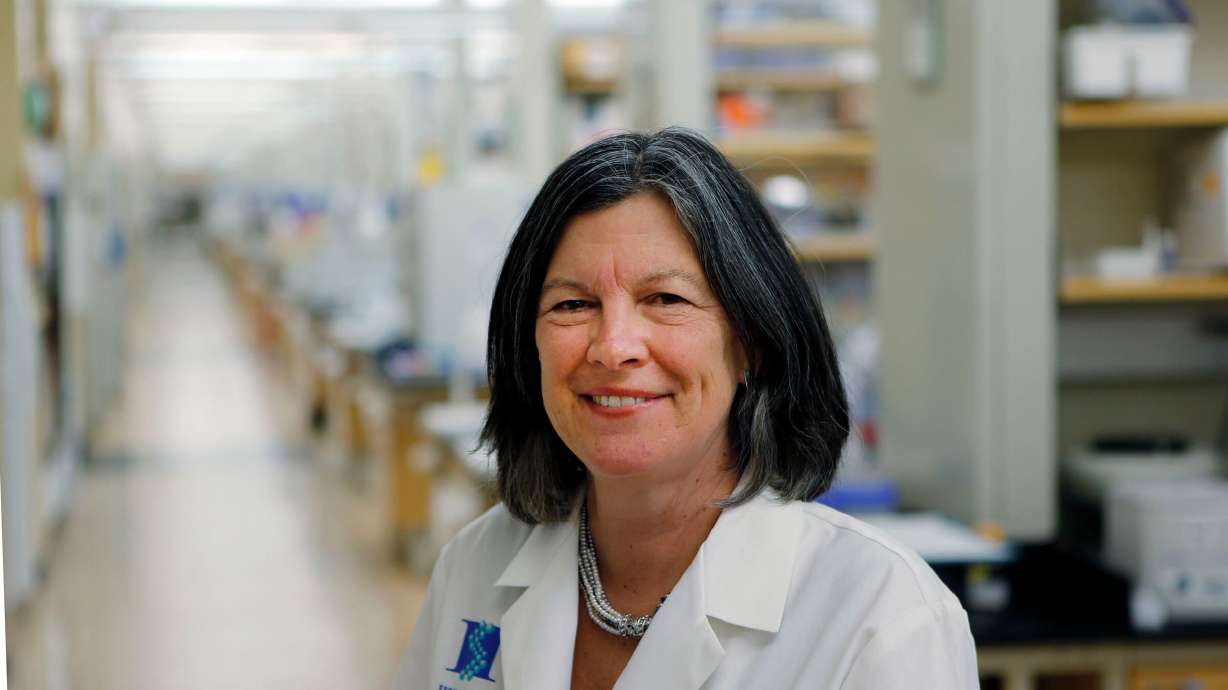- Mary Beckerle will step down as CEO of the Huntsman Cancer Institute, effective Sept. 1, she announced Wednesday.
- Beckerle will remain on the board of directors and continue academic roles at the University of Utah.
- Brad Cairns, a cancer cell biologist and professor of oncological sciences, will succeed Beckerle.
SALT LAKE CITY — Mary Beckerle is stepping down from her long tenure as CEO of Huntsman Cancer Institute at the University of Utah. Beckerle announced Wednesday she would leave the position she's held for 19 years on Sept. 1.
She's not leaving the institute entirely; she will serve on the board of directors that oversees the Huntsman Cancer Foundation and as a distinguished professor of biology and oncological sciences at the University of Utah. She will continue to serve on boards and advisory groups, including the Medical Advisory Board of the Howard Hughes Medical Institute and the Scientific Advisory Council of the American Association for Cancer Research.
Among accomplishments under her leadership, the institute became the region's sole National Cancer Institute-designated Comprehensive Cancer Center. An institute announcement of the role changes touted "extraordinary growth in infrastructure, national reputation, cancer discovery and clinical expertise to communities across the Mountain West" during her leadership.
The National Cancer Institute said the Utah institute serves patients from Utah, Nevada, Montana, Wyoming and Idaho.
University of Utah President Taylor Randall said in a written statement announcing Beckerle's departure as CEO, "Through the visionary guidance of Dr. Beckerle, Huntsman Cancer Institute was propelled to international prominence in cancer research, care and community impact."
Expressing gratitude for her years of service and leadership — she became CEO in 2006 — Randall added that Beckerle, who holds a doctorate degree, "marshaled every aspect of Huntsman Cancer Institute to advance the audacious goal of Jon M. Huntsman: to eradicate cancer from the face of the earth."
Cairns to take helm
Cancer cell biologist Brad Cairns, who holds a a doctorate, will replace Beckerle. Currently head of the institute's academic affairs and a professor of oncological sciences at the university, Cairns has been on the institute's leadership team for 15 years and has, like Beckerle, been at the institute since it was created in 1999. Cairns is an elected fellow of the American Academy of Arts and Sciences and the Royal Society.
The institute calls Cairns "an internationally renowned scientist" who has served in many roles, including as chairman of the Department of Oncological Sciences and director of graduate programs in molecular biology at the university. His National Institutes of Health and Howard Hughes Medical Institute-funded research has helped shape the field of cancer epigenetics and precision oncology, per the announcement. He has also overseen expanded collaborations with Brigham Young University, Utah Valley University, and the U. to engage students in cancer training. He led formation of the Huntsman Cancer Institute-UVU Health Collaborative and graduate capstone projects at Huntsman Cancer Institute for BYU biomedical informatics students.

Cairns received his doctorate from Stanford University in cell biology in the lab of Nobel laureate Roger Kornberg and later completed postdoctoral training in the lab of Fred Winston in the Department of Genetics at Harvard Medical School. He holds the Jon M. Huntsman Presidential Endowed Chair in Cancer Research, awarded by the Utah Legislature in 2018 after Jon M. Huntsman died.
Years of growth, advances
"Dr. Beckerle's personal motto is 'tempo'— a call for everyone at Huntsman Cancer Institute to move rapidly forward in advancing cancer discovery and care, understanding that patients are urgently counting on each of us," Dr. Bob Carter, senior vice president for health sciences at the University of Utah, said in the news release. "I am thrilled that Dr. Cairns has accepted our invitation to become Huntsman Cancer Institute's next CEO. He is so deeply embedded in every aspect of its success since it opened its doors, bringing innovative and steady leadership along with a commitment to the 'tempo' required to deliver rapid progress and advance Huntsman Cancer Institute's mission" at the U.
Under Beckerle's leadership, the institute's inpatient capacity grew from 50 beds to 148, and more than 350,000 patient visits are accommodated annually. The institute became the region's first and only center for proton therapy, and the number of laboratories doubled, boosting research space and impact.
The institute's research teams have secured nearly $140 million in new cancer research funds, supporting more than 650 major projects that have included more than 8,000 participants in studies. Additionally, the center has participated in more than 325 clinical trials and trained close to 700 individuals "from high school to early faculty" in a variety of cancer medicine and science programs.
Beckerle also collaborated with University of Utah Health hospitals and clinics leaders on six affiliated cancer hospital sites in five neighboring states. The institute has also created new community clinic sites to meet patient needs, among other efforts to expand care of which she was a key player.
"It is an incredible honor to have served at Huntsman Cancer Institute since the organization opened its doors in 1999," said Beckerle in a written statement. "I am asked so often by colleagues around the world how it is possible we have achieved so much in a relatively short time. The answer to me is clear: our people, all united around a compelling mission. Emanating from our inspiring principal benefactors, the Jon M. and Karen Huntsman family, to our patients, donors, faculty, clinical providers, staff, students, and all who stand by our side — we have convened a community where every aspect of what we do is laser-focused on delivering hope, healing and improved outcomes for cancer patients."
She praised her successor as "passionate and dedicated."
Peter Huntsman, chairman and CEO of the Huntsman Cancer Foundation, said the institute staffers under Beckerle's leadership "have made our family's ambition around cancer treatment a reality."










